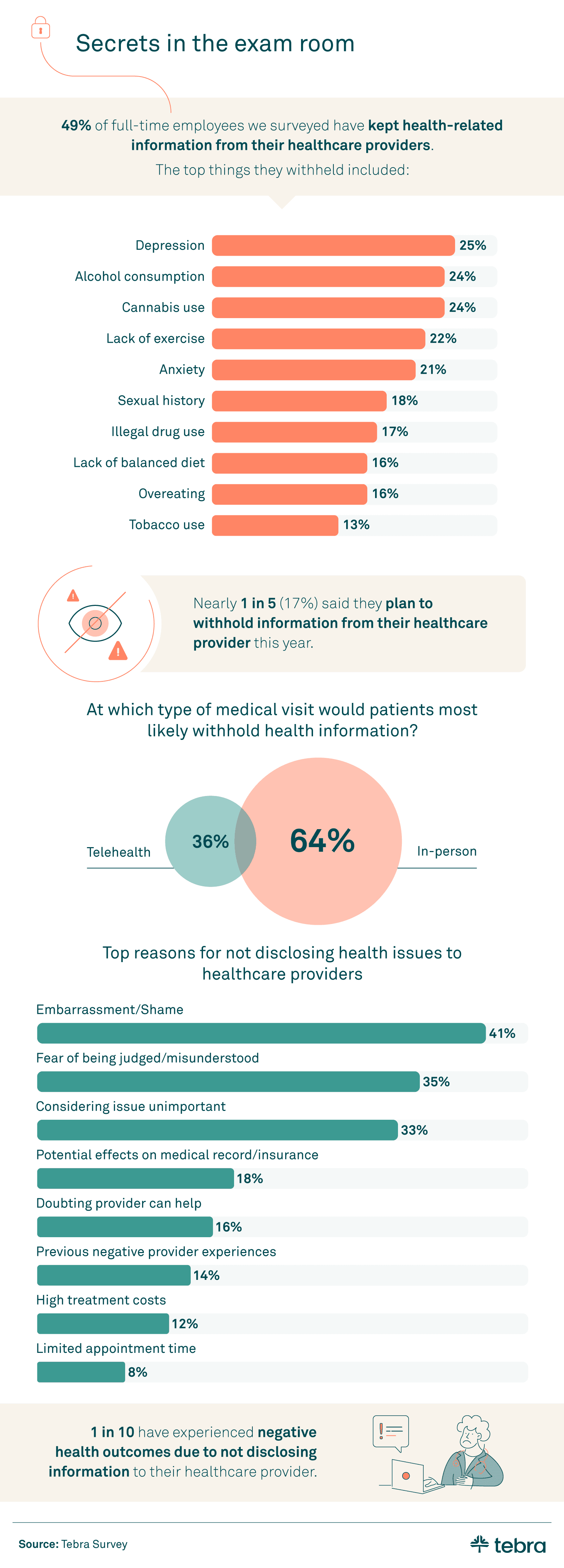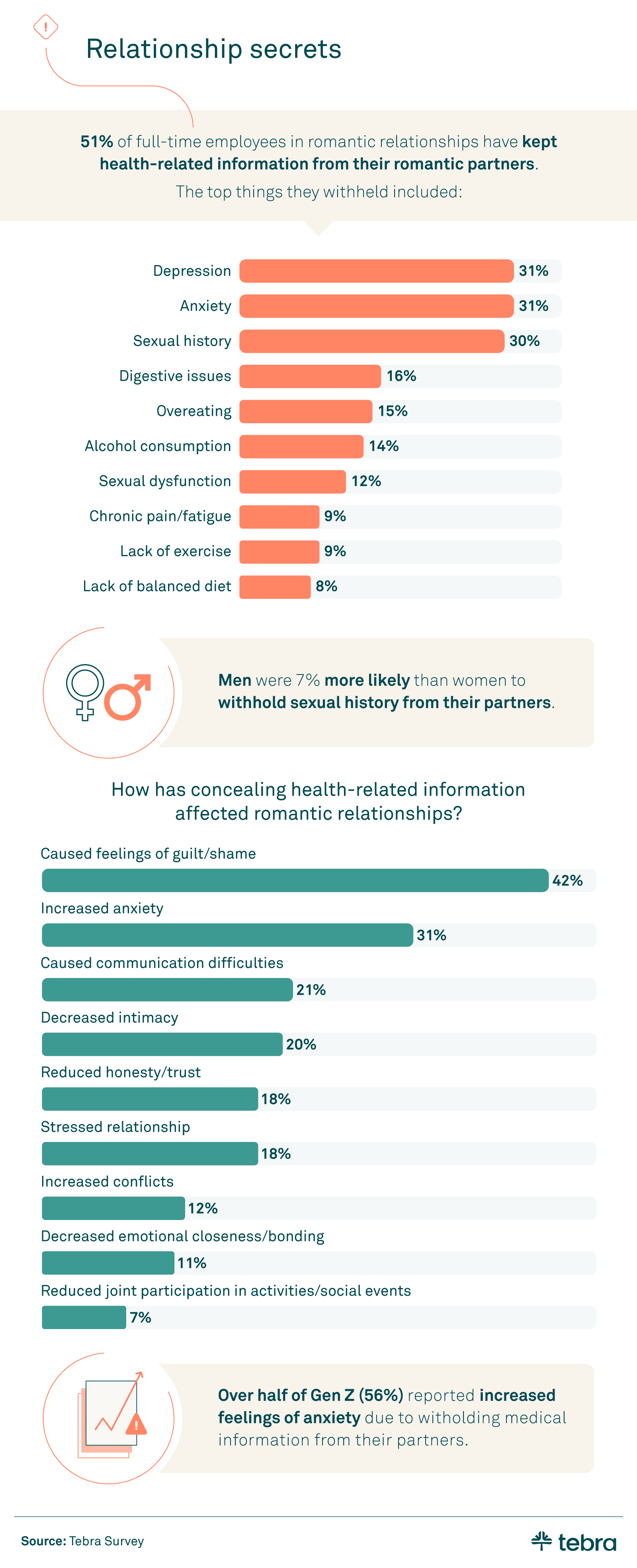Concealing health information has become a silent epidemic. Why do some Americans hide their health concerns from healthcare providers, romantic partners, and employers, and what are the repercussions?
At the nexus of wellness and relationships, withholding personal health information is a silent struggle many people feel they face alone. To shed some light on this private battle, Tebra surveyed over 1,000 full-time employees in romantic relationships.
Their answers reveal the prevalence of health information nondisclosure to healthcare providers, romantic partners, and employers — and the web of reasons behind it. From embarrassment to discrimination fears, our findings reveal the top concerns behind the decision to hide health issues and the factors that could turn the tide toward transparency and trust.
Key takeaways
- Nearly half of Americans surveyed (49%) have withheld medical information from their providers, with the most common omissions being about depression, alcohol consumption, and cannabis use.
- Over half of Americans surveyed (51%) have concealed health-related information from their romantic partners, with depression, anxiety, and sexual history being the most commonly withheld.
- 1 in 5 who withhold health information from romantic partners say it decreases intimacy.
- Nearly 3 in 10 believe being open about their health issues at work could affect their career advancement.
Withholding health information from healthcare providers
Candor between patients and healthcare providers is necessary for effective care. Our first section examines the dynamics of personal disclosure, examining who patients are most likely to keep in the dark about their health-related information and why.

Nearly half of Americans surveyed (49%) confessed to omitting medical details from their healthcare providers, with depression, alcohol consumption, and cannabis use being the top concealed issues. When it came to dietary habits, 1 in 5 Millennials had chosen not to disclose their overeating.
Women were more reticent than men overall, with 58% of women hiding their health information compared to 41% of men. In terms of provider preferences, a strong majority of both women (94%) and men (81%) opted for providers of their own gender, although 19% of men reported a greater comfort with female providers.
Telehealth sessions seemed to make men and women nearly equally reserved: 38% of men withheld information in these situations, as did 34% of women. Making patients comfortable in these digital experience settings is critical for earning their trust, and one way to do that is to make virtual healthcare as convenient and accessible as possible.
Generational differences also emerged. When Gen Z individuals did not disclose health issues, it was most often because this youngest generation felt the problems were minor, with 45% following this rationale. Conversely, Gen Xers and Millennials were more likely to keep silent due to embarrassment or shame. These were also the reasons most respondents had for withholding information about their alcohol consumption.
Here are the primary reasons patients cited for not disclosing certain health issues to their healthcare providers:
- Embarrassment/shame: 41%
- Concerns about being judged or misunderstood: 35%
- Believing the issue was not serious enough to mention: 33%
- Fear that the information might affect their medical record and future insurance: 18%
- Thinking the doctor couldn’t help with the issue: 16%
- Past negative experiences with doctors: 14%
- Worry about treatment costs: 12%
- Limited appointment time: 8%
Easing thoughts and fears like these can help patients feel more comfortable sharing their personal health information. One way to do that is by providing a personalized patient experience centered on tailored interactions and easy-to-access care.
Health secrecy in personal relationships
Our next study segment explores secrecy within personal relationships and the impacts of withholding health information on emotional connections and overall well-being.

Transparency in personal relationships, especially romantic ones, can influence both emotional well-being and healthcare outcomes. Over half of Americans surveyed (51%) admitted to hiding health-related information from their romantic partners. For 20% of these individuals, such omissions have led to a tangible decrease in intimacy. The aspects most often kept secret were depression and anxiety. Sexual history was the third-most hidden aspect, and one that 20% of Gen Zers and 27% of Millennials have chosen not to share their partners.
Our study also highlighted gender disparities in health-related privacy among partners: 21% of women versus 10% of men concealed digestive issues, and women were more than twice as likely to withhold information about overeating. Conversely, men were significantly more likely to keep their alcohol consumption to themselves. Withholding health details from a partner caused men to experience 77% more relationship stress than women who had done the same.
Could marriage bonds encourage more openness among couples? Unmarried individuals exhibited a 21% higher propensity to conceal depression from their partners compared to married ones. Hiding problems like these can make things worse: Gen Zers, in particular (56%), reported a surge in anxiety due to not disclosing medical information to a partner.
The impacts of medical nondisclosure extended beyond romantic ties, with 35% of study participants reporting that their parents had kept health information from them, causing worry (44%), concern (39%), frustration (34%), and feelings of betrayal (13%). This was less of a problem among brothers and sisters, especially for Gen Z — this generation was the least likely to hide health information from their siblings.
Respondents most frequently concealed health-related issues from the following people:
- Parents: 51%
- Extended family: 24%
- Children: 18%
- Siblings: 18%
- Spouse/partner: 15%
- Grandparents: 14%
This discretion underscores a complex web of privacy and openness within personal relationships and its effect on mental health and interpersonal dynamics.
Health disclosure in the workplace
Now that we’ve identified health-related discretion in interpersonal relationships, let’s turn to the workplace. Our study suggests some reasons why employees withhold health-related information at work and the factors that could foster a more open dialogue about their health concerns.

At work, the decision to divulge personal health information may require careful thought. Nearly half of employees (46%) chose not to share details about things like anxiety, depression, and cannabis use with employers. Their silence was largely attributed to fear — a third of employees worried about losing respect, facing discrimination, or jeopardizing their job security.
Discrimination concerns were especially pronounced regarding divulging cannabis use, with 2 in 5 of those who kept it a secret citing this fear as the primary reason. Despite its legal status in many places, workers in most states can still be fired or denied jobs for using cannabis in their free time. While this is a topic of debate, it remains a concern for workers in many industries.
According to employees, the path to openness about personal health issues is paved with trust in supervisors, a nonjudgmental culture, and robust privacy policies. Yet, the dilemma persists, especially among women: 49% of women have withheld information about their anxiety, often due to concerns about discrimination.
Overall, nearly half of those hiding anxiety (48%) and depression (47%) did so fearing bias, and 28% of respondents were scared to share any health issues. Around the same proportion (3 in 10) were concerned it could hurt their chances at career advancement. Women — 18% more than men — felt that being candid about their health could threaten their job security.
This data paints the workplace as a place where health information is guarded for fear of career implications.
Moving toward healthcare openness
Our insights tell a story of insecurity and fear surrounding health disclosure that spans the domains of healthcare provision, personal relationships, and the workplace. Patients withhold sensitive details from healthcare providers out of embarrassment or fear, potentially obstructing critical care. Intimacy and trust within relationships are also tested, as many hold back these personal details to avoid discomfort or judgment. In the professional sphere, the tightrope of sharing health information is fraught with the fear of discrimination and career repercussions.
Yet, as our findings point to a desire for safe, supportive, and understanding work environments, these guidelines can also be applied to doctor’s offices, homes, and family dynamics. It highlights the overarching need for a culture that fosters open communication and mutual trust, where sharing one’s health struggles is met not with stigma but with support, and where the well-being of individuals is seen as integral to the health of the community at large.
Methodology
Tebra surveyed 1,009 Americans to explore honesty about health-related information. All respondents were in relationships and had full-time jobs.
About Tebra
In 2021, with a combined mission to unlock better healthcare, Kareo and PatientPop joined forces to form Tebra — a complete practice automation solution for independent healthcare providers. With an all-in-one, purpose-built platform to drive practice success and modernize every step of the patient journey, Tebra provides digital tools and support to attract new patients, deliver modern care, get paid quickly, and operate efficiently. To learn more about how Tebra is committed to improving patients’ and providers’ success and well-being, visit www.tebra.com.
Fair use statement
If our survey findings resonate with you or your audience, you are welcome to share the insights for any noncommercial purpose. In doing so, we ask that you attribute the information properly by providing a link back to this page, allowing readers to access the full context of the study.






